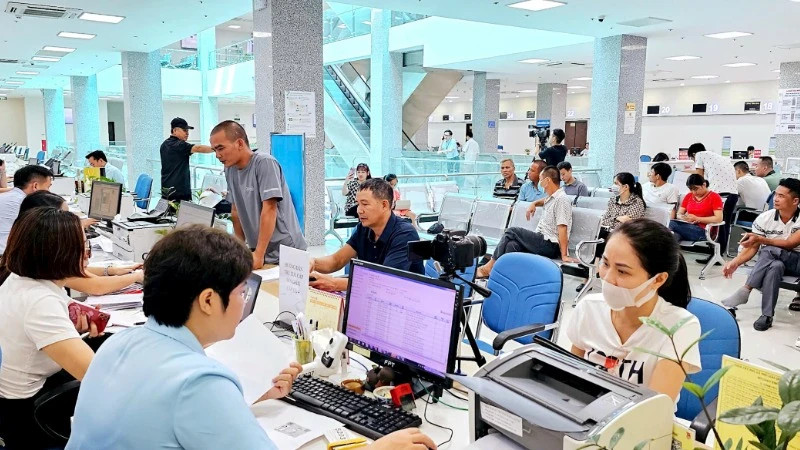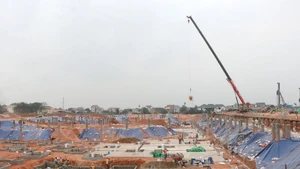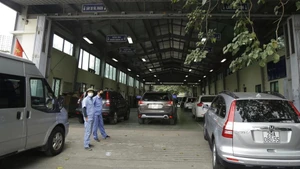Part 1: Aiming for public satisfaction
The role of digital transformation in administrative reform is crucial. It not only enhances the operational efficiency of state agencies but also brings tangible benefits to citizens and enterprises.
To realise the advantages of resolving administrative procedures and delivering online public services, Ha Noi has intensified the application of information technology in handling administrative tasks. Its IT infrastructure and equipment continue to be maintained, upgraded, supplemented, and improved. The city has also delegated administrative procedure resolution responsibilities by sector and field, ensuring that administrative reform objectives are met.
Reception and result-delivery offices across Ha Noi are equipped with posted contact details — phone numbers, addresses, and emails — for receiving feedback and complaints about administrative regulations. This allows citizens to directly reach out when encountering difficulties. In addition, Ha Noi integrates and delivers public services through the National Public Service Portal, ensuring process standardisation and simplification of procedures, while using authentication and data sharing from the National Population Database.
The city has also launched multiple public service points and agencies. Instead of travelling to administrative offices, citizens can visit the nearest service point to complete online procedures such as business registration, licensing, birth registration, social insurance, taxation, and civil status documentation. Staff at these public service points are well-trained, ready to assist citizens, and supported by computer systems, high-speed internet, and necessary equipment to ensure smooth provision of online services.
Beyond Ha Noi, Quang Ninh Province — which has been chosen by the government to pilot the single-tier Public Administration Service Centre model — has achieved a 99.8% rate of on-time or early resolution of administrative dossiers. Over 70% of these were processed ahead of schedule in the first three months of 2025. More than 91.7% of applications were handled via online public services, 100% of fees and charges were paid cashlessly, and satisfaction ratings via survey forms consistently exceeded 99.9%.
Nguyen Hai Van, Director of the Quang Ninh Public Administration Service Centre, noted: “Average labour productivity in administrative procedure resolution has increased, as the centre and its branches maintain fixed positions for officials from departments and offices to regularly handle complex documents and dossiers.”
Despite these achievements, digital transformation in administrative reform still faces several challenges. Institutional and policy frameworks remain incomplete; cybersecurity and information safety are underprioritised in many places; the quality of online public services is inconsistent; and human resources for digital transformation are lacking in terms of both quantity and quality, with uneven distribution.
Even in Quang Ninh, where the single-tier centre model has yielded positive results, operational challenges persist. The administrative procedure resolution process remains incomplete as the system is still being upgraded. Services supporting administrative procedure resolution based on citizen needs — such as design and planning services, service declarations, contract drafting, full-package business establishment, seal issuance, and tax filing — are not yet in place.
Furthermore, leaders of some agencies and units have yet to show genuine interest or take proactive, positive steps toward administrative reform. Simplification and reduction of procedures have fallen short of expectations; some public officials still lack the required capacity and qualifications; national and sectoral database integration, connection, and data sharing are progressing slowly; and the quality of online public services remains subpar.
Pham Le Hung, Chairman of the People’s Committee of Cam Pha City (Quang Ninh Province), remarked that some applications are still delayed. In certain cases, issues faced by businesses have not been resolved in a prompt manner, underscoring the need for more comprehensive digital transformation to enhance quality and efficiency and shorten the processing time for citizens and enterprises.
In Gia Lai Province, online public service deployment still has shortcomings. The province's digital transformation index remains low, and the IT proficiency of residents is limited, especially in ethnic minority areas. The proportion of households with computers, smartphones, internet connectivity, and digital access equipment is low and improving slowly.
Additionally, the quality and effectiveness of online public service delivery and usage are still limited and fall short of targets. Data sharing and connectivity between agencies and units face many barriers and inefficiencies. Large databases have not yet been developed, and open data is not provided to citizens and businesses, creating difficulties in data exploitation and utilisation.
Nguyen Xuan Thanh, a resident of Ton That Thuyet Street, Thong Nhat Ward, Pleiku City (Gia Lai Province), shared that although digitalisation has been implemented, many administrative procedures remain lengthy and require numerous documents — especially land-related ones — causing considerable difficulty for citizens in preparing applications.
Meanwhile, some have suggested that local governments need to ensure transparency and openness in providing information to the public, particularly regarding land-use planning. At the same time, greater opportunities should be provided for citizen monitoring of governmental activities. Recognising and addressing the challenges of digital transformation in administrative reform is crucial to achieving effective administrative modernisation.
(To be continued)
















